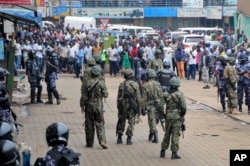A Ugandan legislator allegedly tortured by security officials will be allowed to travel to the United States for medical care, a Ugandan political activist has told VOA.
Kiwanuka Lawrence Nsereko, who lives in New York State, told VOA's Africa News Tonight radio program Friday evening that Robert Kyagulanyi has been freed from the Kampala hospital where he was held, and taken to the airport.
Nsereko said he’d spoken with Kyagulanyi’s family shortly after the news came out in Kampala. His family is “trying to scramble” to find him a flight, Nsereko said. His understanding is that Kyagulanyi will come to the Washington area, but it will depend on the availability of flights.
Thursday night police detained Kyagulanyi and fellow opposition lawmaker Francis Zaake at the Kampala airport as they tried to leave the country. The police said the two opposition figures, who both face treason charges, were fleeing the country. Zaake has not yet been freed.
Both men said they were tortured after their previous arrests, and a Kampala hospital had referred them for medical care abroad. Kyagulanyi, a popular singer known as Bobi Wine, was headed for the United States while Zaake was headed for India.
Upon reaching the airport, the opposition legislators were told they did not have clearance to travel and were taken to a government hospital in police ambulances. Their arrest sparked protests around Kampala, which were at times met with police gunfire and tear gas Friday.
Their lawyer, Asumani Basalirwa, says the director of criminal investigations, Grace Akullo, told him that since the legislators said they were tortured, government doctors needed to examine them.
“After the examination, they could then decide whether to take them to court or not. So today the government doctors were here. They were able to speak to the Honorable Robert Sentamu Kyagulanyi and we don’t know what will be the result of that discussion. But they didn’t carry out any examinations. And strangely they didn’t meet Honorable Francis Zaake,” Basalirwa said.
Nsereko says the international media and social media campaign by supporters of the opposition politicians appears to have helped free Kyagulanyi. “The government is realizing they are making a mistake.”
He says this new development, however, while a relief for many people in Uganda, has not defused tensions entirely. In addition to Zaake, other protesters and critics of the government remain in prison and have been beaten. “The world needs to understand that it is more than just one person.”
Kyagulanyi, Zaake and three other opposition lawmakers originally were among more than 30 people arrested in early August after a protest broke during campaigning for by-election. Protesters threw stones at and damaged President Yoweri Museveni's vehicle.
Museveni has been president since 1986. Many older Ugandans still support the 74-year-old leader. But about 75 percent of Ugandans are under the age of 35, and they are beginning to tire of his authoritarian rule.
At the same time, human rights organizations and opposition politicians say the government has grown increasingly repressive toward critics.
This article originated in VOA's English to Africa Service, with contributions from Kim Lewis and Halima Athumani.





